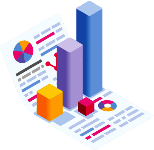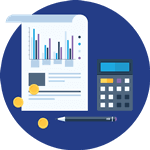 In the intricate landscape of academic pursuits, mastering the art of regression analysis is hard for students. This statistical technique, used to explore relationships between variables and make predictions, requires a deep understanding of mathematical concepts and an analytical mindset. To assist students in navigating this challenging terrain, we proudly present our guidance, guided by experienced writers who can offer customized regression homework solutions. At Data Analysis Help.net, we understand the struggles that students face when tackling regression assignments. Whether you are a novice looking to grasp the fundamentals or an advanced learner aiming for precision, our team of seasoned writers is here to provide the necessary support. We recognize that regression analysis extends beyond simple linear relationships and encompasses multiple variations like multiple regressions, logistic regression, and more. Our proficient writers possess the expertise to tackle assignments of any complexity, making us your trusted partner in this academic journey. What sets us apart is our unwavering commitment to delivering the best assistance. We understand that each assignment is unique and requires a tailored approach. Our writers, well-versed in the intricacies of regression analysis, utilize their extensive knowledge to craft meticulously researched and precisely structured assignments. From gathering data to conducting analyses and interpreting results, our team ensures that your assignment not only meets but exceeds the academic standards. Furthermore, our writers bring real-world experience into the equation. They have worked on diverse projects across various fields, applying regression analysis in practical scenarios. This practical exposure enables them to offer insights that transcend textbook theories, adding depth and relevance to your assignments. Whether your assignment pertains to economics, psychology, engineering, or any other field, our writers possess the versatility to cater to your specific needs. In addition to delivering top-quality content, we prioritize timeliness and affordability. We understand the importance of adhering to deadlines and offer competitive pricing to ensure our services are accessible to all students. Your academic success is our primary goal, and we are dedicated to making it a reality by offering quality regression analysis paper writing help. When it comes to tackling regression assignments, our services, led by experienced writers, stand as the beacon of knowledge and assistance you need. We are here to empower you, providing you with the best regression assignment writing assistance to help you excel in your academic endeavors. With our team by your side, you can approach regression analysis assignments with confidence, knowing that you have a reliable partner to guide you through the complexities of the subject.
In the intricate landscape of academic pursuits, mastering the art of regression analysis is hard for students. This statistical technique, used to explore relationships between variables and make predictions, requires a deep understanding of mathematical concepts and an analytical mindset. To assist students in navigating this challenging terrain, we proudly present our guidance, guided by experienced writers who can offer customized regression homework solutions. At Data Analysis Help.net, we understand the struggles that students face when tackling regression assignments. Whether you are a novice looking to grasp the fundamentals or an advanced learner aiming for precision, our team of seasoned writers is here to provide the necessary support. We recognize that regression analysis extends beyond simple linear relationships and encompasses multiple variations like multiple regressions, logistic regression, and more. Our proficient writers possess the expertise to tackle assignments of any complexity, making us your trusted partner in this academic journey. What sets us apart is our unwavering commitment to delivering the best assistance. We understand that each assignment is unique and requires a tailored approach. Our writers, well-versed in the intricacies of regression analysis, utilize their extensive knowledge to craft meticulously researched and precisely structured assignments. From gathering data to conducting analyses and interpreting results, our team ensures that your assignment not only meets but exceeds the academic standards. Furthermore, our writers bring real-world experience into the equation. They have worked on diverse projects across various fields, applying regression analysis in practical scenarios. This practical exposure enables them to offer insights that transcend textbook theories, adding depth and relevance to your assignments. Whether your assignment pertains to economics, psychology, engineering, or any other field, our writers possess the versatility to cater to your specific needs. In addition to delivering top-quality content, we prioritize timeliness and affordability. We understand the importance of adhering to deadlines and offer competitive pricing to ensure our services are accessible to all students. Your academic success is our primary goal, and we are dedicated to making it a reality by offering quality regression analysis paper writing help. When it comes to tackling regression assignments, our services, led by experienced writers, stand as the beacon of knowledge and assistance you need. We are here to empower you, providing you with the best regression assignment writing assistance to help you excel in your academic endeavors. With our team by your side, you can approach regression analysis assignments with confidence, knowing that you have a reliable partner to guide you through the complexities of the subject.
What Must You Avoid When Solving Regression Problems?
When solving regression problems, there are several pitfalls and mistakes that you should avoid to ensure the accuracy and reliability of your model. Here are some key points to consider:
- Overfitting: One of the most common mistakes in regression analysis is overfitting. This occurs when a model learns to fit the training data too closely, capturing noise and random fluctuations rather than the underlying patterns. To avoid overfitting, it's essential to use techniques like cross-validation, regularization, and early stopping.
- Underfitting: On the flip side, underfitting happens when a model is too simple to capture the underlying relationships in the data. This leads to poor predictive performance. To prevent underfitting, consider using more complex models or adding more relevant features.
- Incorrect feature selection: Choosing the right set of features is crucial in regression analysis. Including irrelevant or redundant features can lead to a less interpretable and less accurate model. Carefully consider feature selection techniques, like feature engineering and feature importance analysis, to choose the most informative variables.
- Multicollinearity: Multicollinearity occurs when two or more independent variables in your model are highly correlated. This can make it challenging to identify the individual effects of these variables on the target variable and can lead to unstable coefficient estimates. Detect and handle multicollinearity using techniques like correlation analysis or principal component analysis.
- Outliers: Outliers can have a significant impact on regression models, skewing parameter estimates and reducing model accuracy. Identify and handle outliers appropriately by visualizing data, using robust regression methods, or transforming variables.
- Data leakage: Data leakage occurs when information from the target variable or future data is inadvertently included in the training set, leading to unrealistically high model performance. Ensure strict separation between training and test data to avoid this issue.
- Ignoring assumptions: Regression models have underlying assumptions, such as linearity, homoscedasticity, and normality of residuals. Failing to check and address these assumptions can lead to biased results and unreliable predictions. Use diagnostic plots and statistical tests to assess and correct any violations.
- Overconfidence: Avoid making overly confident predictions without considering uncertainty. Always report prediction intervals or confidence intervals along with point estimates to convey the uncertainty associated with your model's predictions.
How Can Our Expert Homework Writers Guarantee Academic Excellence?
Our expert writers can guarantee academic excellence through their specialized knowledge, skills, and commitment to delivering high-quality regression assignment writing services. They can ensure your academic excellence through:
- In-Depth Understanding of Regression: Our writers have a profound understanding of regression analysis, including linear, logistic, polynomial, and multiple regression. They are well-versed in the underlying mathematical concepts and statistical techniques, allowing them to tackle complex regression problems effectively.
- Accurate Data Analysis: Regression homework involves working with real-world data sets. We have the expertise to preprocess, clean, and analyze data accurately, ensuring that the results are meaningful and relevant to the research question.
- Customized Solutions: They tailor their solutions to the specific requirements of your homework assignment. Whether it's a simple linear regression problem or a complex multivariate analysis, expert writers can adapt their approach to meet your academic needs.
- Error-Free Work: Academic excellence requires attention to detail. Our experts are meticulous in their work, checking for errors in calculations, assumptions, and interpretations to ensure the final solution is error-free.
- Proper Documentation: They provide clear and well-organized documentation of their work. This includes detailed explanations of the regression model, data transformations, variable selection, and the rationale behind their choices. Proper documentation helps you understand the solution and learn from it.
- Plagiarism-Free Content: Our writers uphold academic integrity by delivering original work. They avoid plagiarism and cite sources properly if external references are used, ensuring that your homework is academically honest.
- Meeting Deadlines: Academic excellence also involves meeting deadlines. Our writers are accustomed to working under time constraints, ensuring that your homework is submitted on time without compromising quality.
- 24/7 Support: Our writers offer round-the-clock support, allowing you to ask questions, seek clarification, or discuss your homework requirements at any time.
- Confidentiality: They maintain strict confidentiality regarding your homework assignment and personal information, ensuring your privacy and academic integrity are protected.
 When it comes to offering help, our statistics and regression assignment experts play a pivotal role in ensuring academic success and delivering high-quality work. This conclusion reaffirms the importance of choosing seasoned professionals when seeking assistance. Our writers possess the knowledge and expertise required to handle complex regression assignments effectively. They are well-versed in the various regression models and statistical techniques, which allows them to provide accurate and insightful analysis. Moreover, their familiarity with academic writing standards and guidelines ensures that the assignments are structured, formatted, and cited correctly, meeting the highest standards of quality. Additionally, our writers can efficiently handle various regression topics and tailor their services to meet the unique needs of students at different educational levels. Whether it's a simple linear regression task or a more intricate multivariate analysis, their expertise enables them to produce solutions that not only meet but often exceed expectations. Furthermore, students who opt for services from experienced writers benefit from a smooth and hassle-free experience. These professionals understand the importance of adhering to deadlines and can deliver assignments promptly, reducing the stress and anxiety associated with tight submission schedules. The choice of experienced writers for assignment assistance is a wise one. It guarantees accurate analysis, adherence to academic standards, and timely submission. Moreover, it empowers students to excel in their studies and gain a deeper understanding of regression analysis. Therefore, when faced with the complexities of regression assignments, entrusting the task to experienced writers is a decision that can lead to improved academic performance and a brighter future.
When it comes to offering help, our statistics and regression assignment experts play a pivotal role in ensuring academic success and delivering high-quality work. This conclusion reaffirms the importance of choosing seasoned professionals when seeking assistance. Our writers possess the knowledge and expertise required to handle complex regression assignments effectively. They are well-versed in the various regression models and statistical techniques, which allows them to provide accurate and insightful analysis. Moreover, their familiarity with academic writing standards and guidelines ensures that the assignments are structured, formatted, and cited correctly, meeting the highest standards of quality. Additionally, our writers can efficiently handle various regression topics and tailor their services to meet the unique needs of students at different educational levels. Whether it's a simple linear regression task or a more intricate multivariate analysis, their expertise enables them to produce solutions that not only meet but often exceed expectations. Furthermore, students who opt for services from experienced writers benefit from a smooth and hassle-free experience. These professionals understand the importance of adhering to deadlines and can deliver assignments promptly, reducing the stress and anxiety associated with tight submission schedules. The choice of experienced writers for assignment assistance is a wise one. It guarantees accurate analysis, adherence to academic standards, and timely submission. Moreover, it empowers students to excel in their studies and gain a deeper understanding of regression analysis. Therefore, when faced with the complexities of regression assignments, entrusting the task to experienced writers is a decision that can lead to improved academic performance and a brighter future.
Help with Writing Coursework on Regression Analysis | Best Guide

In the realm of statistics and data analysis, the art of understanding and interpreting complex relationships between variables is essential. One of the most powerful tools in this domain is regression analysis, a statistical technique that allows researchers to explore and quantify the associations between dependent and independent variables. However, delving into the world of regression analysis can be a challenging endeavor for students and researchers alike, requiring a comprehensive understanding of statistical concepts, mathematical calculations, and data interpretation. This is where our expertise comes into play, we can offer custom support for regression homework, providing you with the best guide to navigate this intricate terrain. At times, coursework on regression analysis can be overwhelming due to its multifaceted nature. It demands a deep understanding of statistical concepts such as linear and non-linear regression, multiple regressions, logistic regression, and more. Moreover, the ability to use statistical software like R, Python, or specialized tools is crucial for performing regression analysis efficiently. Furthermore, interpreting and presenting the results in a coherent and insightful manner is equally important. We can help to alleviate the burdens associated with writing coursework on regression analysis. Whether you are a student grappling with a class assignment or a researcher endeavoring to publish a paper, our experienced team of experts is here to guide you through the process. We understand that each regression analysis task is unique and requires a tailored approach. That's why we offer customized and affordable linear regression homework writing support that caters to your specific needs and academic level. We will provide you with a roadmap to successfully tackle coursework on regression analysis. We will demystify the fundamental concepts, share practical tips for data preparation, guide you through model selection, help you interpret the results, and teach you how to communicate your findings effectively. With our guidance, you will not only complete your coursework with confidence but also enhance your understanding of regression analysis as a valuable tool in the field of statistics and data science. Join us on this journey through the intricate world of regression analysis as we unlock its potential and make the process of writing coursework on this subject a rewarding and enlightening experience.
How to identify dependent and independent variables in regression analysis
Identifying dependent and independent variables in regression analysis is crucial for understanding the relationships between variables and building predictive models. Here's how you can distinguish them:
- Dependent Variable (DV): The dependent variable is the outcome or the target variable you want to predict or explain. It is also known as the response variable. In regression analysis, it is placed on the y-axis of a scatterplot. Examples of dependent variables include: Sales revenue, test scores, temperature, and stock prices
- Independent Variable (IV): Independent variables are the factors or predictors that may influence or explain changes in the dependent variable. They are also referred to as predictor variables, explanatory variables, or features. In regression analysis, one or more independent variables are plotted on the x-axis. The dependent variable is the outcome you are interested in predicting, explaining, or analyzing the relationship with. Independent variables are the variables you manipulate or measure to understand their impact on the dependent variable. In simple linear regression, you have one dependent variable and one independent variable, whereas in multiple linear regression, you have multiple independent variables. The choice of dependent and independent variables should be guided by your research question or the problem you are trying to address.
Domain knowledge is essential in identifying the appropriate dependent and independent variables. Understanding the context and relationships between variables is crucial. Consider the cause-and-effect relationships, theories, or hypotheses related to your research area. Collect data that includes measurements of both dependent and independent variables. Ensure that the data is properly organized, and variables are clearly labeled to facilitate analysis.
How we can help you answer regression analysis questions step by step?
To assist with regression analysis questions step by step, it's crucial to follow a systematic approach. By offering Help with Writing Coursework on Regression Analysis, our experts can offer this guide;
- Begin by thoroughly grasping the context and objectives of the regression analysis. What is the goal of the analysis? What are the variables of interest, and how do they relate to each other?
- Gather relevant data, ensuring it's clean and complete. Handle missing values and outliers appropriately. Organize the data into a format suitable for analysis.
- Decide which regression model (e.g., linear, logistic, polynomial) is most appropriate for your data and research question. Consider the assumptions associated with your chosen model.
- Start by fitting the regression model to your data. Use statistical software or programming languages like R or Python to perform this step. Interpret the model coefficients and assess their significance.
- Evaluate the model's performance using appropriate metrics such as R-squared, Mean Squared Error (MSE), or others depending on the type of regression. Check for multicollinearity, heteroscedasticity, and other model assumptions.
- If necessary, perform feature selection or variable elimination techniques to improve model simplicity and interpretability.
- Explain the relationships between the independent and dependent variables based on the model coefficients. Discuss their practical implications in the context of the problem.
- Validate the model's performance on a separate dataset or through techniques like cross-validation to ensure its generalizability.
- Communicate your findings effectively through visualizations, tables, and clear explanations. Highlight key insights and any actionable recommendations.
- Be open to refining the model or seeking additional data if necessary. Consider exploring different regression techniques or addressing any limitations in your analysis.
 Regression analysis is a fundamental component of statistics and data analysis, and mastering it is essential for both academic success and practical applications in various fields. From the basics of linear regression to more advanced topics like multiple regressions and logistic regression, it covers a wide range of concepts and techniques. Furthermore, it emphasizes the importance of data preparation, assumptions, and interpretation of results, ensuring that students gain a well-rounded understanding of the subject. One of the key strengths is its clarity and accessibility. It breaks down complex concepts into manageable chunks, making it easier for students to grasp the underlying principles. The inclusion of real-world examples and practical tips enhances the learning experience, bridging the gap between theory and application. Additionally, we promote critical thinking and problem-solving skills by encouraging students to consider the appropriateness of regression analysis for different research questions and datasets. This fosters a deeper understanding of when and how to apply regression techniques effectively, which is essential for future research endeavors. The availability of additional resources, such as software recommendations and further reading suggestions, ensures that students have the tools they need to excel in their coursework and beyond. We are a valuable companion for students navigating the intricacies of regression analysis. It empowers them to tackle coursework and research projects with confidence, equipping them with the knowledge and skills necessary for success in the realm of statistical analysis. Whether you are a novice or a more experienced learner, our best regression modeling assignment writers can provide the guidance and support needed to excel in the field of regression analysis.
Regression analysis is a fundamental component of statistics and data analysis, and mastering it is essential for both academic success and practical applications in various fields. From the basics of linear regression to more advanced topics like multiple regressions and logistic regression, it covers a wide range of concepts and techniques. Furthermore, it emphasizes the importance of data preparation, assumptions, and interpretation of results, ensuring that students gain a well-rounded understanding of the subject. One of the key strengths is its clarity and accessibility. It breaks down complex concepts into manageable chunks, making it easier for students to grasp the underlying principles. The inclusion of real-world examples and practical tips enhances the learning experience, bridging the gap between theory and application. Additionally, we promote critical thinking and problem-solving skills by encouraging students to consider the appropriateness of regression analysis for different research questions and datasets. This fosters a deeper understanding of when and how to apply regression techniques effectively, which is essential for future research endeavors. The availability of additional resources, such as software recommendations and further reading suggestions, ensures that students have the tools they need to excel in their coursework and beyond. We are a valuable companion for students navigating the intricacies of regression analysis. It empowers them to tackle coursework and research projects with confidence, equipping them with the knowledge and skills necessary for success in the realm of statistical analysis. Whether you are a novice or a more experienced learner, our best regression modeling assignment writers can provide the guidance and support needed to excel in the field of regression analysis.


 NB: Sometimes we need to first assess your work to quote accordingly. Equally we may highlight a service input review on your placed order to confirm if the paid amount is
NB: Sometimes we need to first assess your work to quote accordingly. Equally we may highlight a service input review on your placed order to confirm if the paid amount is
